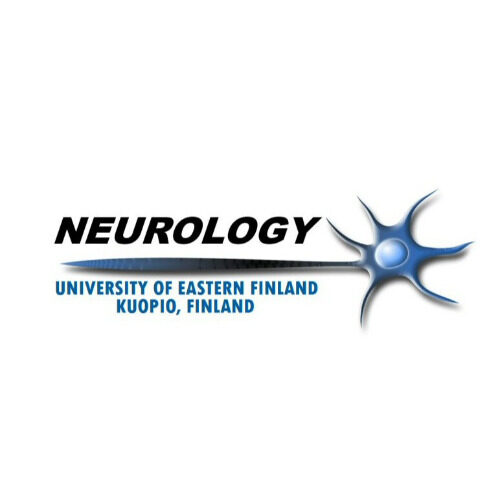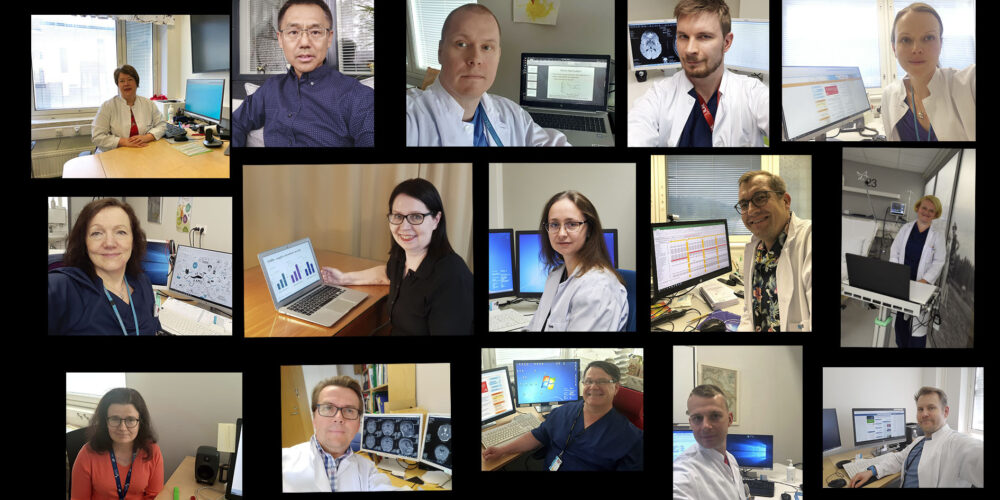
Clinical Epilepsy Research
Leaders
Clinical Epilepsy Research build upon close collaboration between researchers within the University of Eastern Finland and Kuopio University Hospital Epilepsy Center. Professor Reetta Kälviäinen leads the research group with the focus on clinical epileptology including identifying biomarkers of seizure activity, epileptogenesis, progression, and drug-resistancy in cohorts of newly diagnosed and drug-resistant chronic patients. These aspects of scientific projects are combined with therapeutic neuropharmacological and neurosurgical interventions. The group uses genetic data from carefully phenotyped patient cohorts to discover genes related to epilepsy syndromes and to characterize patient disease trajectories. Reetta Kälviäinen is an expert on rare, neurodegenerative progressive myoclonus epilepsies and has collected and deep-phenotyped the largest cohort of progressive myoclonus type 1 (EPM1) patients in the world.
The overall objective of the clinical epilepsy group is to optimize the treatment outcomes of patients with epilepsy both using current therapies but also striving to develop new more effective and safer treatments for tomorrow. Our group achieves these goals through a multi-disciplinary team of investigators including specialists in adult and pediatric epileptology, neuropsychology, neurophysiology, neuroradiology, neuropathology, and genetics. We also immediately incorporate our research efforts in routine clinical care.
Clinical Epilepsy Research belongs to UEF Neuroscience Research Community NSciRC the goal of which is to understand the disease-specific and common molecular mechanisms underlying neurodegenerative diseases and epilepsy, and to identify biomarkers and novel therapeutic approaches for their prevention and cure by merging biological and computational neurosciences.
Cooperation partner: Epilepsy Center / Kuopio University Hospital Neurocenter
The Epilepsy Center offers diagnostics and treatment of difficult epilepsy for adults and children. This center of excellence combines expertise in several specialist fields. It is a member in the European Reference Network (ERN) for Rare and Complex Epilepsies EpiCARE. Specialist services include genetical evaluations, intracranial EEGs and epilepsy surgery.
Facilities
-
Kuopio University Hospital (KUH) in Kuopio is one of the five university hospitals in Finland. KUH is publicly owned hospital, financed by the North Savo Hospital District and responsible for the tertiary care in Eastern Finland. KUH is the teaching hospital of the UEF. KUH NeuroCenter is almost unique in Nordic countries for the fusion of Neurology + Neurosurgery + Kuopio Epilepsy Center in 2010 into a single carer of neurodiseases of the KUH population. The center has 19,800 outpatient visits, and 2,200 operations. KUH NeuroCenter houses 5 clinical professors and 7 adjunct professors of UEF, and performs with UEF Neuro internationally acclaimed research in degenerative brain diseases, epilepsy, intracranial aneurysm, stroke, multimodal brain imaging, and brain mapping.
-
Kuopio Epilepsy Center at KUH, directed by professor Reetta Kälviäinen, provides diagnostics, improved drug therapy and epilepsy surgery for the patients with intractable epilepsy nationally in Finland. Our epilepsy center provides modern facilities, multidisciplinary team, comprehensive neurophysiological unit and 24/7 video-EEG unit. The multidisciplinary epilepsy team contains over 20 experts from Neurology, Pediatric Neurology, Neurophysiology, Neurosurgery, Neuroradiology and Neuropathology About 2000 patients with epilepsy overall and 150 patients with intractable epilepsy are evaluated annually, and 30 undergo epilepsy surgery. Tertiary services are linked in a unique way to a community-based service with access also to patients with newly-diagnosed and well-controlled epilepsy. KUH Epilepsy Center was selected to the European Reference Network (ERN) for Rare and Complex Epilepsies EpiCARE launched 3/2017 and KUH Epilepsy Center has been designated to coordinate diagnostics and treatment of difficult epilepsy nationally in Finland by a governmental decree (582/2017).
-
UEF Clinical Epilepsy Research Group together with KUH Epilepsy Center has collected several cohorts of patients with well-defined epilepsy syndromes that are associated with drug resistance and/or disease progression, but a proportion of which is also well controlled. To provide real long-term data of the natural course of the epilepsies, biomarker studies need to be community based, but in most other systems, the well-controlled patients would never make it to an epilepsy center. In KUH, both community-based service and national tertiary service are combined, providing an excellent facility for this study. Our EpiCARE membership and national coordination responsibilities give us a high possibility of expanding our collaboration nationally to find the most meaningful patient cohorts from the population. We are also participating in several large-scale international collaborations to facilitate increased throughput and cohort sizes.
-
Research Electronic Data Capture (RedCap) Epilepsy DataBase of 2000 epilepsy patients connected with genomic, imaging, neurophysiology and circulating biomarker data. Our RedCap database is maintained by UEF Bioinformatics Center.
-
KUH Epilepsy Center has digital epilepsy care pathway for patients with possibilities to e-contacts, e-questionnaires and remote visits.
-
The Biobank of Eastern Finland and Kuopio data lake serve the research community with high quality sample collections and clinical data.
-
Close collaboration with Neurocenter Finland for national projects and implementation.
Projects
-
Biomarkers Based Stratification of Human Epilepsies-Translating into Precision Medicine
Funding: Saastamoinen Foundation and Government Research Funding
PI: Reetta KälviäinenIn Europe, epilepsy affects 6 million people of all ages and the lifetime risk for epilepsy is nearly 4%. Despite medical advances, approximately 30% of patients are drug refractory, and they experience significant associated co-morbidities, such as depression, cognitive impairment and other neurodevelopmental and neuropsychiatric diseases. The etiology of co-morbidities is multi-factorial; antiepileptic drugs, genetic factors, seizures and interictal epileptic discharges all contribute. Most treatment decisions in epilepsy are largely based on trial and error. Biomarkers provide tools to individualize treatment choices. A combination of validated biomarkers will enable individual decisions on who should receive treatment in the pre-clinical state and who would benefit from novel treatments, thus improving the chances for rapidly controlling and minimizing the risks of chronicity, co-morbidity and progression of the disease.
In this study, we will integrate different methodologies (clinical, genetic, electrophysiological, imaging and circulating biomarkers) to predict therapy response and to better understand the interplay of epileptic activity and other pathophysiological processes of epilepsy. By carrying this study, we are able to identify patients at high risk for therapy resistance and find ways for patients to do more informed decisions of their treatment. Our research is in line with the vision of how the use of personalised medicine approaches will promote “next-generation” medicine in 2030, more firmly centred on the individual’s personal characteristics, leading to increased effectiveness, economic value, and equitable access for all citizens to the best possible healthcare (The ICPerMed vision for 2030 (2019)).
We collaborate with various international biomarker-projects:
- Epi25: The largest sequencing project in the epilepsies so far, funded by the United States National Human Genome Research Institute (NHGRI) and aims to understand the inherited components of epilepsy.
- ENIGMA-Epilepsy, network of imaging genomics, the largest-ever neuroimaging study of people with epilepsy. ENIGMA includes also MELD-project, which uses AI to detect focal cortical dysplasia.
- Human Epilepsy Project HEP international multimodal prospective evaluation of biomarkers in newly treated patients with focal epilepsy-
-
Rare Diseases of Finnish Disease Inheritage and Their Mechanisms
Funding: Business Finland, Academy of Finland, Saastamoinen Foundation and Government Research Funding
PI: Reetta Kälviäinen, Academy Clinical Researcher for EPM1 project: Jelena HyppönenThere are over 6000 rare diseases described worldwide. The disease is considered to be rare if it affects 1 person per 2000. The large New Modalities Ecosystem for developing capabilities in Rare Diseases, Biologics and New Treatment Modalities was launched in 2018. The aim of this New Modalities Ecosystem is to enable improved understanding of disease pathology related to the symptoms and disease progression and better treatments by applying large molecular drugs and diagnostic tools as well as digital wearable patient tools for disease symptom recording. This Ecosystem combines in a unique way high-level academic research with industrial drug research and development. The Ecosystem participants include Orion, University of Turku, University of Helsinki, University of Eastern Finland, Folkhälsan as well as the companies PerkinElmer, Syrinx Bioanalytics, AdmeScope, Petsofi, Forendo Pharma.
The project “Rare Diseases of Finnish Disease inheritage, MIRAS, IOSCA, AHS, EPM1 and their disease mechanisms” is a part of the New Modalities Ecosystem that is being led by prof. Kälviäinen in the University of Eastern Finland and Kuopio University Hospital. MIRAS is a mitochondrial recessive ataxia syndrome), IOSCA is an infantile-onset spinocerebellar ataxia) and EPM1 is progressive myoclonus epilepsy type 1. IOSCA and MIRAS are recessive disorders caused by mitochondrial dysfunction, and the recessive EPM1 is a consequence of dysfunction of a defect in inhibition by cathepsins. We are also interested in neuronal ceroid lipofuscinosis 3 (CLN3).
Progressive myoclonus epilepsies (PMEs) are a clinically and etiologically highly heterogeneous group of inherited neurodegenerative disorders. Despite advances in understanding their molecular genetic basis the underlying disease mechanisms are still poorly understood and no specific effective therapies exist. PMEs are characterized by myoclonus, tonic-clonic seizures, and progressive neurological decline, in particular ataxia.
Progressive myoclonus epilepsy type 1, Unverricht-Lundborg disease (EPM1; OMIM 254800), is an autosomal recessive inherited disorder caused by loss-of-function mutations in the cystatin B (CSTB) encoding a ubiquitously expressed inhibitor of several cysteine cathepsins. The prevalence of EPM1 is increased in certain populations and in Finland its prevalence is higher than anywhere else. Our group has deep-phenotyped the largest cohort of EPM1 patients in the world.
Our study will have a substantial effect on promoting development of the new therapies for the management of rare epilepsies. It will propose new potential pathophysiological pathways for drug targeting. Better characterization of the disease phenotype and its progression will provide a substantial background for in-vitro research, which in return will aim to provide novel targeted therapies. New biomarkers genetic/neuroinflammatory/neurophysiological will be investigated and proposed for future patients’ evaluation. It will develop new means for the follow up of the patients’ symptoms in clinics and at home. It will provide validated reliable cost-efficient evaluation tools for both clinicians and drug trials. It will propose better characterization of medication regimes and comorbidities in EPM1 patients. The results will provide background for the better treatment and promoting of patients’ wellbeing beyond the disease. The experience and the results will be used for studies of other rare diseases.
We collaborate with
-
- The academic work is a collaborative effort of the research groups of Academy Professor Anu Suomalainen Wartiovaara in FinMIT Centre of Excellence, University of Helsinki, and of Professor Anna-Elina Lehesjoki, in the Folkhälsan Research Center and Medicum,University of Helsinki.
- EPM1-Eco-project focuses on developing wearable home-based monitoring for myoclonic jerks in EPM1. Algorithms are developed by Biomedical Signal Analysis Group at UEF with PI Professor Pasi Karjalainen.
- The New Modalities Ecosystem participants include Orion, University of Turku, University of Helsinki, University of Eastern Finland, Folkhälsan as well as the companies PerkinElmer, Syrinx Bioanalytics, AdmeScope, Petsofi, Forendo Pharma.
- Development and validation of automatic myoclonus quantification method in collaboration with Neuro Event Labs Oy.
-
-
Rational antiepileptic drug selection by combining gene network and ICT analysis
Funding: ERAPerMED/Academy of Finland project for personalized medicine for epilepsy combining pre-clinical and clinical data analysis with ICT-solutions
PI: Reetta Kälviäinen Finland), Karl-Martin Klein, Galgary, Canada (international lead)
Out-of-hospital EEG
Funding: Vaajasalo Foundation
PI: Esa Mervaala, PhD Student Sampsa LohiThe project aims to study the suitability of the Bittium BrainStatus electode and amplifier for on-the-move recording of EEG in the ambulance. After the feasibility trials we will investigate if the method can be used to help in the diagnosis of acute stroke during the transfer of the patient from the field to our hospital’s emergency department. In the future, out-of-hospital EEG recording could potentially also be used in the diagnosis of status epilepticus. We are also developing AI algorithms for the analysis of the emergency EEG data.
People
-
- Jelena Hyppönen, MD, PhD
- Leena Jutila, MD, PhD
- Anne-Mari Kantanen, MD, PhD
- Jarkko Kirjavainen, MD, PhD
- Päivi Koskenkorva, MD, PhD
- Pekka Poutiainen, PhD
- Marja Äikiä, PhD
-
- Olli-Pekka Intke, MD, Early-career researcher
- Sampsa Lohi, MD, Early-career researcher
- Laura Parviainen, MD, Early-career researcher
- Maria Raatikainen, M.Sc., Early-career researcher
- Anni Saarela, MD, Early-career researcher
- Joni Sairanen, MD, Early-career researcher
- Oskari Timonen, M.Sc, Early-career researcher
- Lotta Vanhatalo, MD, Early-career researcher
-
- Linda Arpiainen
- Heidi Broman
- Erkka Heinonen
- Jenna Jalkanen
- Jonna Konttila
- Jaakko Kosunen
- Tuomas Poranen
- Khong Trinh
Keywords
Leaders
Professors
-
Esa Mervaala
ProfessorInstitute of Clinical Medicine, School of Medicine, Faculty of Health Sciences -

Petro Julkunen
ProfessorDepartment of Technical Physics, Faculty of Science, Forestry and Technology -
Ville Leinonen
ProfessorSchool of Medicine, Faculty of Health Sciences
Senior Researchers
-
Yawu Liu
Senior ResearcherInstitute of Clinical Medicine, School of Medicine, Faculty of Health Sciences -

Tuomas Rauramaa
Clinical LecturerInstitute of Clinical Medicine, School of Medicine, Faculty of Health Sciences -

Laura Säisänen
Senior ResearcherInstitute of Clinical Medicine, School of Medicine, Faculty of Health Sciences -
Anne-Mari Kantanen
Visiting Trainer
Supporting Staff
Other group members
-
Arto Immonen
-
Mervi Könonen
-
Pirjo Lavi, Research Nurse/Coordinator
Publications
14 items-
Abnormal motor cortical adaptation to external stimulus in Unverricht-Lundborg disease (progressive myoclonus type 1, EPM1)
Julkunen, Petro; Löfberg, Olli; Kallioniemi, Elisa; Hyppönen, Jelena; Kälviäinen, Reetta; Mervaala, Esa. 2018. Journal of neurophysiology. 120: 617-623 -
Analysis of shared heritability in common disorders of the brain
Anttila, V; Bulik-Sullivan, B; Finucane, HK; Walters, RK; Bras, J; Duncan, L; Escott-Price, V; Falcone, GJ; Gormley, P; Malik, R; Patsopoulos, NA; Ripke, S; Wei, Z; Yu, D; Lee, PH; Turley, P; Grenier-Boley, B; Chouraki, V; Kamatani, Y; Berr, C; et al [Incl Kälviäinen, Reetta]. 2018. Science. 360: eaap8757 -
Antiepileptic drug treatment of generalized tonic-clonic seizures: An evaluation of regulatory data and five criteria for drug selection
Shorvon, SD; Bermejo, PE; Gibbs, AA; Huberfeld, G; Kälviäinen, R. 2018. Epilepsy and behavior. 82: 91-103 -
Etiologies and characteristics of refractory status epilepticus cases in different areas of the world: Results from a global audit
Ferlisi, M; Hocker, S; Trinka, E; Shorvon, S; International Steering Committee of the StEp Audit (incl. Singh, G; Kälviäinen, R; Kramer, U; Godoy, D; Newton, C; O'Brien, T; Cook, M; Rossetti, A; Groppa, S; Kumlien, E; Ercegovac, M; Yasiry, Z; Guecht, A; Wu, T; Nabbout, R; Tripathi, M; et al.). 2018. Epilepsia. 59: 100-107 -
European trends in epilepsy surgery
Baud, Maxime O; Perneger, Thomas; Racz, Attila; Pensel, Max C; Elger, Christian; Rydenhag, Bertil; Malmgren, Kristina; Cross, J Helen; McKenna, Grainne; Tisdall, Martin; Lamberink, Herm J; Rheims, Sylvain; Ryvlin, Philippe; Isnard, Jean; Mauguiere, Francois; Arzimanoglou, Alexis; Akkol, Serdar; Deniz, Kaancan; Ozkara, Cigdem; Lossius, Morten et al. [Incl Kälviäinen, Reetta]. 2018. Neurology. 91: E96-E106 -
Genome-wide mega-analysis identifies 16 loci and highlights diverse biological mechanisms in the common epilepsies
The International League Against Epilepsy Consortium on Complex Epilepsies; [Incl. Kälviäinen, Reetta]. 2018. Nature communications. 9: 5269 -
Reducing valproate use in women with epilepsy
Kälviäinen, Reetta; Straus, Sabine; Dogne, Jean-Michel; Bakchine, Serge; Haas, Manuel. 2018. The Lancet Neurology. 17: 580-581 -
Structural brain abnormalities in the common epilepsies assessed in a worldwide ENIGMA study
Whelan, CD; Altmann, A; Botía, JA; Jahanshad, N; Hibar, DP; Absil, J; Alhusaini, S; Alvim, MKM; Auvinen, P; Bartolini, E; Bergo, FPG; Bernardes, T; Blackmon, K; Braga, B; Caligiuri, ME; Calvo, A; Carr, SJ; Chen, J; Chen, S; Cherubini, A; et al [Incl. Kälviäinen, R]. 2018. Brain. 141: 391-408 -
Variants p.Q1236H and p.E1143G in mitochondrial DNA polymerase gamma POLG1 are not associated with increased risk for valproate-induced hepatotoxicity or pancreatic toxicity: A retrospective cohort study of patients with epilepsy
Hynynen, J; Pokka, T; Komulainen-Ebrahim, J; Myllynen, P; Kärppä, M; Pylvänen, L; Kälviäinen, R; Sokka, A; Jyrkilä, A; Lähdetie, J; Haataja, L; Mäkitalo, A; Ylikotila, P; Eriksson, K; Haapala, P; Ansakorpi, H; Hinttala, R; Vieira, P; Majamaa, K; Rantala, H; et al. 2018. Epilepsia. 59: 2125-2136 -
Epilepsy-associated long-term mortality after aneurysmal subarachnoid hemorrhage
Huttunen J, Lindgren A, Kurki MI, Huttunen T, Frösen J, Koivisto T, von und zu Fraunberg M, Immonen A, Jääskeläinen JE, Kälviäinen R. 2017. Neurology. 89: 263-268



